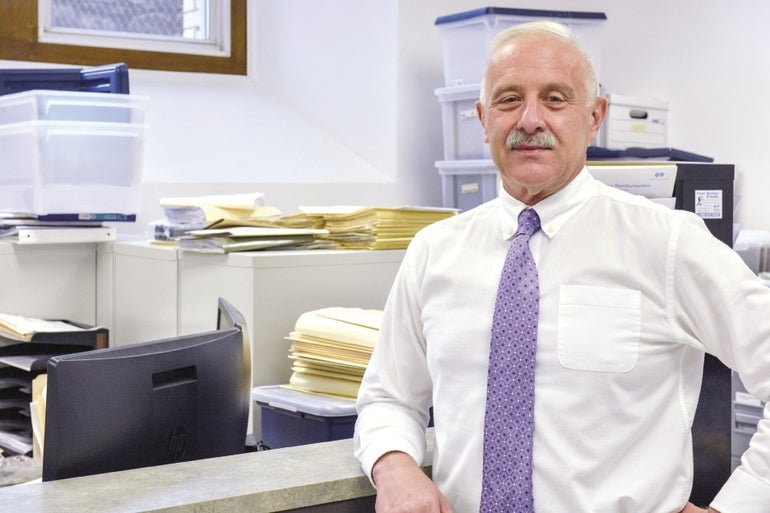The largest Central Mass. communities are bulking up their rainy day funds
 PHOTO/EDD COTE
John Richard, the Leominster comptroller, said the city has used a strong economic period to begin paying down long-term financial obligations.
PHOTO/EDD COTE
John Richard, the Leominster comptroller, said the city has used a strong economic period to begin paying down long-term financial obligations.
A decade ago this month, the Great Recession was in full swing: the Dow Jones Industrial Average had its worst day of trading in its history, Lehman Brothers filed for bankruptcy, and the federal government bailed out AIG and took over Freddie Mac and Fannie May.
Now, despite a long run of economic growth, economists are predicting when the next market correction or recession may hit. Whenever that slow-down comes, many of Central Massachusetts' largest cities and towns appear more ready for a rainy day now than before the Great Recession — even if there are more complicated factors, such as debt, pension costs and other retiree obligations.
“That tremendous burden will only get worse during a recession, so we've positioned ourselves to be able to withstand that,” John Richard, Leominster's comptroller, said of such harder-to-see municipal costs.
Leominster is among the most aggressive of the 10 largest cities and towns in Central Massachusetts. The city's stabilization fund, as a municipal rainy day fund is known, has more than doubled in the past decade, and the city has made aggressive moves toward paying down its long-term liabilities for pension costs and retiree costs including health care.
Leominster's had much of the same city leadership for a generation, including Mayor Dean Mazzarella, who's been in office for 24 years. Residents and city councilors appreciate the long-term focus the administration has kept, Richard said.
“They get it,” he said. “We keep them informed, and they understand the benefits.”
More rainy-day funds
For the largest cities and towns in the region, rainy day funds generally far exceed what they were before the Great Recession. But there's a bit of a catch: rainy-day funds are higher in part because so are property tax bills.
In Worcester, for example, the city's stabilization reserve fund was about $2.6 million at the start of the fiscal 2007. By the start of fiscal 2017, the account had ballooned to $18 million. But the average residential property tax bill during that time rose by $903, or 30 percent. Others grew by even more.
The Massachusetts Department of Revenue doesn't track average commercial and industrial tax bills in cities and towns, but tax levies – the total amount of property and personal property taxes collected – have risen considerably in most of Central Massachusetts' largest communities in the past decade.
Hudson, for example, collected 64 percent more in property taxes in fiscal 2018 than it did a decade prior, and Franklin, Shrewsbury and Worcester each collected more than 50 percent more during that stretch.
The annual revenue collected from Worcester's commercial and industrial tax base grew the most in that time, by 82 percent, or more than $41 million.
More long-term obligations
Although rainy-day funds are up from a decade ago, the fiscal picture gets complicated by other factors.
Pension and employee retirement funds have generally skyrocketed in the years since the recession, and many communities have just begun paying down those obligations, statistics show.
In Fitchburg, for example, unfunded pension liabilities have grown by $19 million since 2012. In Marlborough, general debt has risen by $92 million since 2011, and in Framingham, it's up by $88 million.
Steve Ng, a finance professor at Clark University in Worcester, cautioned communities' higher savings levels may mask a lack of urgency in dealing with pension or retiree healthcare costs known as OPEB, or other post-employment benefits.
“I'm not sure if that's going to be sufficient,” Ng said, generally speaking of communities' savings and his doubts for whether those amounts can ultimately cover long-term obligations that can often hit tens of millions of dollars.
Some towns have worked to pay down long-term costs while times are good.
Shrewsbury, for example, plans to have its pension obligations fully covered by fiscal 2020. The town has contributed roughly $5 million a year toward those costs, Town Manager Kevin Mizikar said.
Shrewsbury has worked to ensure that savings are about 4 percent of the operating budget, the manager said.
“We certainly have been meeting that, and will look to move toward some stronger financial policies this fall,” Mizikar said, alluding to a proposal to direct even more money to savings.
Acton has reduced its OPEB liabilities by nearly half since 2013, while in Milford, the stabilization fund has grown to nearly one-quarter of the operating budget, or around $25 million, a more than tripling in the past decade.
“It was a lot of change in ideology,” said Zachary Taylor, who became the town's first finance director just after the recession and has guided Milford toward higher savings levels since.
Each year, Milford puts $5 million toward pension costs and a smaller amount, roughly $600,000 per year, toward OPEB costs. It keeps excess levy amounts, which allows the town to increase its tax revenue if needed without a tax override, Taylor said.
Forecasting a recession
As for when the economy may dip back into a recession and the rainy-day funds will be needed, there isn't yet any consensus, of course.
“I've been expecting recessions for the past three years, and it hasn't happened,” said Ng, who also runs his own financial advisory business, Woodland Investment Consulting.
Real gross domestic product increased 4.2 percent in the second quarter of 2018. But even with the longest bull market on record, economists still try determining when growth will slow.
“You always don't see it until it happens, but I don't see anything emerging as a threat” to the current run of growth, said Robert Nakosteen, a business professor at UMass Amherst's Isenberg School of Management.
That includes the country's burgeoning trade war with China and other nations, Nakosteen said, which he believes is more likely to hurt individual companies or sectors than the economy as a whole.
“It would be very surprising if it led us into a recession,” he said.













0 Comments